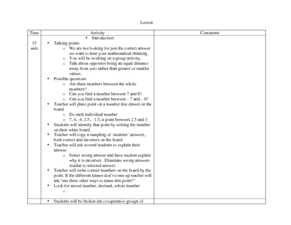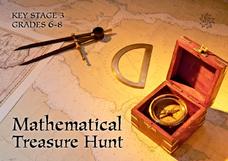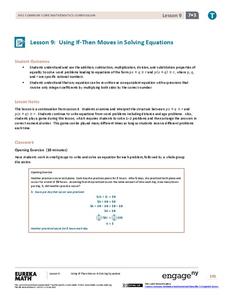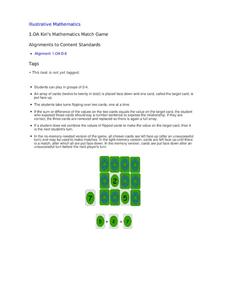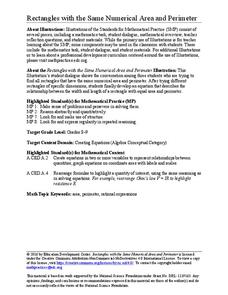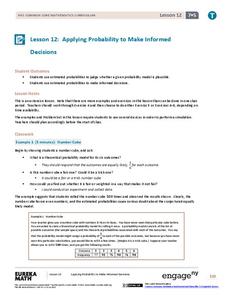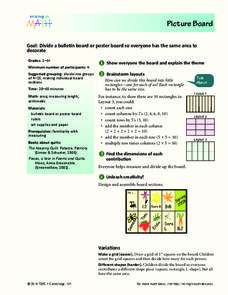Odyssey of the Mind
Odyssey of the Mind Curriculum Activity: Made Up Math
Is there a way to connect creative thinking, logical reasoning, mathematical understanding, and humor? You bet there is! Kids begin by creating creative math quizzes, which require creative thinking to solve. For example, 1+1=24, one...
Education Closet
Equal Rhythms
Engage young mathematicians in learning about fractions with this cross-curricular math and music lesson. After listening to and repeating different beat patterns, children realize that musical notes are just another way of representing...
Curated OER
Equal Differences Over Equal Intervals 1
Learners explore linear functions concretely using tables of values in a cooperative task. The concept of the values of linear functions changing by equal differences over equal intervals of one is emphasized. Learners will discover...
Curated OER
Equality of Fractions
Here is a lesson on equality of fractions designed for fourth graders. Learners work in groups and utilize fraction bars to help them work through a variety of activities. They split up into pairs and play an online game called the...
Curated OER
Using a Number Line: 5th Grade Math
Working in groups, the class will use what they know about whole number operations to solve a real-world problem involving a number line. They will focus on using the number line to correctly label the placement of whole numbers,...
Curated OER
Mathematical Treasure Hunt
The hunt is on! Young mathematicians follow clues and complete a series of ten math puzzles as they try to crack Dr. Integer's code and find the location of his hidden treasure.
Illustrative Mathematics
Equal Area Triangles on the Same Base II
A deceptively simple question setup leads to a number of attack methods and a surprisingly sophisticated solution set in this open-ended problem. Young geometers of different strengths can go about defining the solutions graphically,...
Education Development Center
Interpreting Statistical Measures—Class Scores
Explore the effect of outliers through an analysis of mean, median, and standard deviation. Your classes examine and compare these measures for two groups. They must make sense of a group that has a higher mean but lower median compared...
Digital Lesson
Cereal Box Surface Area
How much math can your learners pour out of a cereal box? Your middle schoolers will explore their favorite cereal and calculate the surface area, volume, and weight ratios and log this information on the provided worksheet. They get to...
EngageNY
The Difference Between Theoretical Probabilities and Estimated Probabilities
Flip a coin to determine whether the probability of heads is one-half. Pupils use simulated data to find the experimental probability of flipping a coin. Participants compare the long run relative frequency with the known theoretical...
EngageNY
Solving Equations Using Algebra 2
If you use a fabulous lesson plan, then your pupils can become fabulous at solving equations. The 24th installment of 25 incorporates the use of if-then statements to illustrate the properties of equality used in solving two-step linear...
EngageNY
Using If-Then Moves in Solving Equations II
Continuing from the previous lesson in the 28-part series, learners write equations to model problem situations. They then solve the problem by applying the properties of equality. In contrast to the previous lesson, they do not write...
Delaware Math Cadre Elementary Committee
Operations and Algebraic Thinking
How to use the relationship between multiplication and division to solve math word problems is the focus of the instructional activity presented here. In it, fourth graders work in groups to solve problems posed by the teacher. Then,...
Illustrative Mathematics
Kiri's Mathematics Match Game
Learning math is so much more fun when it involves playing games. Following the rules of the classic game Memory, young mathematicians flip over two cards at a time as they look for numbers whose sum or difference is equal to the value...
EngageNY
Estimating Centers and Interpreting the Mean as a Balance Point
How do you balance a set of data? Using a ruler and some coins, learners determine whether the balance point is always in the middle. Through class and small group discussions, they find that the mean is the the best estimate of the...
Illustrative Mathematics
Fruit Salad
Playing with values in this fruit salad problem allows learners to find out how many cherries were mixed in. Your middle schoolers can organize their thoughts in a chart before going into the equation. Eigth graders can skip the chart...
Education Development Center
Rectangles with the Same Numerical Area and Perimeter
Is it possible for a rectangle to have the same area and perimeter? If you disregard units, it happens! In a challenging task, groups work to determine the rectangles that meet these criterion. The hope is that learners will naturally...
Curated OER
Domain: Operations and Algebraic Thinking
Practice basic operations for young mathematicians in fun ways! Using two decks of cards (Ace through 10 plus the joker), learners play "memory" by matching numbers that can be added to make 10 and writing number sentences. In another...
EngageNY
Estimating Probabilities by Collecting Data
Take a spin to determine experimental probability. Small groups spin a spinner and keep track of the sums of the spins and calculate the resulting probabilities. Pupils use simulated frequencies to practice finding other probabilities to...
West Contra Costa Unified School District
Simplify Expressions and Solve Equations Using Two-Column Proofs
Increase understanding of the algebraic properties and their importance. Scholars justify their steps as they simplify expressions and solve equations. They formalize their work as two-column proof.
Virginia Department of Education
Inductive and Deductive Reasoning
Introduce pupils to the two types of reasoning, inductive and deductive. Classmates work in pairs or small groups to learn the difference between the two and apply these reasonings to develop valid conclusions.
EngageNY
Applying Probability to Make Informed Decisions
Use simulations to determine the probabilities of events to make decisions. Class members are presented with several scenarios, some with known probabilities and others without. Groups run simulations to gather data that they then...
EngageNY
Using Sample Data to Compare the Means of Two or More Populations
Determine whether there is a difference between two grades. Teams generate random samples of two grade levels of individuals. Groups use the mean absolute deviation to determine whether there is a meaningful difference between the...
Curated OER
Picture Board
Learners divide a poster board so everyone gets the same amount of area to decorate. Youngsters talk about the different ways to divide a rectangle. They measure their lines to make sure that each piece is equal and then decorate their...




